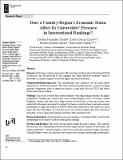Por favor, use este identificador para citar o enlazar a este item:
http://hdl.handle.net/10261/210750COMPARTIR / EXPORTAR:
 SHARE SHARE
 CORE
BASE CORE
BASE
|
|
| Visualizar otros formatos: MARC | Dublin Core | RDF | ORE | MODS | METS | DIDL | DATACITE | |

| Título: | Does a Country/Region's Economic Status Affect Its Universities' Presence in International Rankings? |
Autor: | Fernandez Tuesta, Esteban; Garcia Zorita, Carlos; Romera Ayllon, Rosario; Sanz-Casado, Elías CSIC ORCID | Palabras clave: | Academic Ranking of World Universities Socio-economic indicators Regression analysis |
Fecha de publicación: | 2019 | Editor: | Chinese Academy of Sciences | Citación: | Journal of Data and Information Science 4(2): 56-78 (2019) | Resumen: | Purpose: Study how economic parameters affect positions in the Academic Ranking of World Universities' top 500 published by the Shanghai Jiao Tong University Graduate School of Education in countries/regions with listed higher education institutions. Design/methodology/approach: The methodology used capitalises on the multi-variate characteristics of the data analysed. The multi-colinearity problem posed is solved by running principal components prior to regression analysis, using both classical (OLS) and robust (Huber and Tukey) methods. Findings: Our results revealed that countries/regions with long ranking traditions are highly competitive. Findings also showed that some countries/regions such as Germany, United Kingdom, Canada, and Italy, had a larger number of universities in the top positions than predicted by the regression model. In contrast, for Japan, a country where social and economic performance is high, the number of ARWU universities projected by the model was much larger than the actual figure. In much the same vein, countries/regions that invest heavily in education, such as Japan and Denmark, had lower than expected results. Research limitations: Using data from only one ranking is a limitation of this study, but the methodology used could be useful to other global rankings. Practical implications: The results provide good insights for policy makers. They indicate the existence of a relationship between research output and the number of universities per million inhabitants. Countries/regions, which have historically prioritised higher education, exhibited highest values for indicators that compose the rankings methodology; furthermore, minimum increase in welfare indicators could exhibited significant rises in the presence of their universities on the rankings. Originality/value: This study is well defined and the result answers important questions about characteristics of countries/regions and their higher education system. | Descripción: | Este artículo está sujeto a una licencia CC BY 4.0 | Versión del editor: | http://dx.doi.org/10.2478/jdis-2019-0009 | URI: | http://hdl.handle.net/10261/210750 | DOI: | 10.2478/jdis-2019-0009 | ISSN: | 2096-157X |
| Aparece en las colecciones: | (CCHS-IFS) Artículos |
Ficheros en este ítem:
| Fichero | Descripción | Tamaño | Formato | |
|---|---|---|---|---|
| country_regions.pdf | 1,86 MB | Adobe PDF |  Visualizar/Abrir |
CORE Recommender
SCOPUSTM
Citations
10
checked on 29-mar-2024
WEB OF SCIENCETM
Citations
10
checked on 20-feb-2024
Page view(s)
152
checked on 23-abr-2024
Download(s)
120
checked on 23-abr-2024
Google ScholarTM
Check
Altmetric
Altmetric
Este item está licenciado bajo una Licencia Creative Commons

